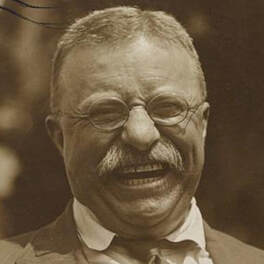 By Dr. Roger Erdvig, WCS Headmaster I Samuel 13 records one of King Saul’s early tests in warfare, and it is a fascinating story. Soon after Saul became king, he found himself facing the Philistine army. While Saul inexplicably sent most of his army home, the Philistines had 30,000 chariots, 6,000 horsemen, and innumerable soldiers. With these ghastly odds, most of the remaining Israelite warriors fled into caves, holes, rocks, tombs, and wells. Those who did not flee stood trembling— a feeble force of just 600 men. But there is an unsettling element of this lopsided contest: the Jewish warriors had no swords. By Dr. Roger Erdvig, WCS Headmaster
WCS’s parking lot is a great example of how society should work. I suppose this claim requires a bit of backstory. Hundreds of cars enter our parking lot twice a day to drop off and pick up WCS students. For years, WCS enjoyed having New Castle County crossing guards direct traffic for all that entering and exiting. It was great--when you approached our entrance your only job was to follow the guards’ directions. Except for the occasional rude or impatient driver buggering up the system, everything worked pretty well. Do what the crossing guard says, and no one gets hurt. By WCS Headmaster, Dr. Roger Erdvig
In 1453, Constantinople—the hub of eastern Christianity—fell to the Ottoman Empire. After decades of spiritual and cultural decay, Constantinople did not have the internal resources to resist the enemy, and invaders overran the city. Thankfully, hundreds of scholars with keen foresight escaped to Europe with copies of ancient Greek manuscripts in tow. These brave academics knew that with the fall of the Christian culture around them, someone had to preserve the New Testament. Out of wreckage from the collapse of their earthly city, a remnant saw the importance of Scripture, and they committed their lives to preserving God’s Word, even at high personal cost. Their battle cry in the new war to be faithful to Scripture was “Back to the sources!” At the same time the Bible was being preserved and protected by scholars from Constantinople, it was also on the verge of explosive worldwide influence. In the very same year, something else happened which would spark widespread commitment to Scripture. While the gates of Constantinople burned, a little-known craftsman in Germany perfected a new invention—the printing press. And his first work? The Gutenberg Bible—the first fully printed book in the West. Before this time, Bibles were copied by hand, and only the wealthiest cathedrals of Christendom had copies. With the printing press, the Bible began a rapid journey around the globe, making God’s Word accessible to millions. By WCS Headmaster, Dr. Roger Erdvig
In last month’s issue of Influence, we looked at the first of Rod Dreher’s suggestions for equipping our children to flourish while living in an antagonistic culture. Since then, we’ve seen some developments in our culture that suggest things will get even more contentious, very quickly. One of those developments arose in an unexpected place – college basketball. March Madness is an American pastime, where the 64 top college basketball teams are whittled down throughout the tournament until the two top teams meet in the championship game. This year, a true underdog has made it into the Sweet Sixteen—a relatively small Christian college in Tulsa, Oklahoma, Oral Roberts University. Ranked 15, ORU took out 2nd seed Ohio State in the first round. Then, in round two, they beat 7th ranked Florida State. By the time you read this article, the ORU Golden Eagles will have played 3rd ranked Arkansas. It’s the stuff of great sports movies. A small college takes on the big guys, and in true David v. Goliath fashion, they just keep winning. You’d think everyone would be watching the ORU Golden Eagles with a sense of awe and wonder. Just a few weeks ago, a Canadian journalist gave me the perfect excuse to get out of mowing. In her article entitled, “Is it Time to De-Colonize Your Lawn?” she makes the case that backyard lawns are vestiges of European colonialism and we should stop cutting the grass.
While this may seem an innocuous article that reflects fringe thinking, it actually serves as a good reminder of how important it is to understand the worldview of others and to evaluate that worldview in light of a Biblical worldview. (It’s also not as fringe as you might think.)  By WCS Headmaster Dr. Roger Erdvig In the 1940s, C. S. Lewis wrote his famous "Screwtape Letters" as a clever means to equip Christians to guard against the wiles of the evil one. In the spirit and style of Lewis' imagined correspondence between a senior demon (Screwtape), and his young tempter-protege (Wormwood), I wrote a new entry on how high school graduates can spot and defend against attacks from the evil one. In this "newly discovered" Screwtape Letter, I imagine how an experienced demon would advise an apprentice on how to trip up a recent Christian school graduate. Note: I have no intention of telling you how I came upon this secret correspondence between what seems to be a more senior demon and his junior apprentice. The text of the letter leads me to believe that the senior demon is responsible for instructing the younger on the art of temptation and how to win an individual over to the evil one. You must keep in mind that when the writer is referring to “our enemy,” he is referring to God, and when referring to “our father below,” he is talking about Satan himself. My Dear Wormwood, Congratulations on your assignment to your new patient. I trust you will be much more vigilant in following my directives on this one than you were with the last, who I must remind you again, escaped your grasp and is now firmly in the hands of the enemy. Frankly, I am amazed that your punishment was not more significant than it was… but that’s a subject for another day. On to the business at hand. Your new patient is ideal for a young, inexperienced tempter as yourself. Actually, I can’t think of a better one on whom you can practice, and perhaps renew your standing with me. She is what the filthy two-legged animals call a “high school graduate,” and they are pathetically easy to confound and confuse. Yes, I am aware that she attended a Christian school, but that can actually play to our advantage. I have often seen where humans who attended Christian schools develop a very desirable habit, at least for our purposes: they tend to skip along blindly, relying on their parents' or their teachers’ connection to the enemy, instead of knowing him for themselves, all the while not even realizing they are living in our clutches. In this way, they practically do all of the work for us. But, don’t get too lazy. You still must exert much effort to win her over to our father’s side.  By WCS Headmaster Dr. Roger Erdvig Theodore Roosevelt didn’t always wear his famous round spectacles. In fact, we find in his autobiography that it wasn’t until late in his childhood that he even realized that he was terribly nearsighted. Though he loved to study nature as a boy, he recalled that he was “always at a hopeless disadvantage” and befuddled because he couldn’t see—and yet was “wholly ignorant that [he] was not seeing.” When he finally got his first pair of glasses, “an entirely new world was opened” to him. This is a common story… an elementary student struggles with paying attention in class but then gets glasses and everything changes. An aspiring tennis player can’t improve beyond basic proficiency until he gets glasses and suddenly he can see the ball just as it hits his opponent’s racquet and his game instantly improves. These are great analogies for another kind of seeing—how we see, understand, and navigate the world around us. Philosophers call this a worldview, and as its name implies, it functions as the lens through which a person views the world. But beyond merely seeing, our worldview dictates how we live in the world. By WCS Headmaster Dr. Roger Erdvig
Most Christian schools include some version of "impacting the culture for Christ" in their mission statements. But very few define what that means, and even fewer seem to specifically plan for how they will actually equip their students to do so. WCS has adopted a set of four key questions that help guide our efforts at helping our students apply a Biblical worldview-- questions that flesh out what it means to impact the culture. These questions are adapted from Restoring All Things: God's Audacious Plan to Change the World Through Everyday People, by John Stonestreet and Warren Cole Smith. (Buy it here on Amazon.) 1) What is good in our community that we can cultivate? In this question, we're looking for what's already good in our community and considering how we can improve it. Whether it's perfecting a piece of music for a concert or re-writing several drafts of a persuasive paper to make it "pop," students are encouraged to take what's good, and make it better. |
Cultivating godly influencersWilmington Christian School provides a distinctively Christian, innovative education that effectively develops Godly influencers who are well prepared for life after high school and who impact the culture for Christ. Archives
May 2024
Categories
All
|
|
Wilmington Christian School provides a distinctively Christian, innovative education that effectively develops Godly influencers who are well prepared for life after high school and who impact the culture for Christ.
Wilmington Christian School admits students of any race, color, national and ethnic origin to all the rights, privileges, programs, and activities generally accorded or made available to students at the school. It does not discriminate on the basis of race, color, national and ethnic origin in administration of its educational policies, admissions policies, scholarship and loan programs, and athletic and other school-administered programs. |
|
|
© Copyright Wilmington Christian School. All Rights Reserved.
Website designed by PROSPER Creative Design
Website designed by PROSPER Creative Design


